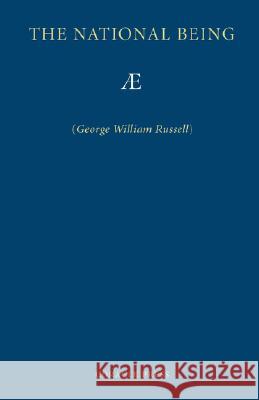The National Being: Some Thoughts on an Irish Polity » książka
The National Being: Some Thoughts on an Irish Polity
ISBN-13: 9781597313049 / Angielski / Miękka / 2007 / 184 str.
George William Russell, better known as AE (1867-1935), mystic, poet, painter, journalist, editor, and practical rural economist, was a pivotal figure in the Irish literary revival and in the emergence of modern Ireland. From the beginning of the twentieth century he formed life-long friendships with W. B. Yeats, George Moore, Lord Dunsany, James Stephens, Stephen Mackenna (translator of the Enneads of Plotinus), James Joyce, and other writers, thinkers, and artists, and was closely associated with the Irish National Theatre Society (later the Abbey Theatre). Russell's influence was as extensive in practical and political affairs as it was in the more intimate spiritual domain. The length and breadth of his thinking on the social issues of his day, which are only heightened in ours, is evident in this present work. This essay may not be economics in the usual] sense of the word. It certainly is not poetry in my sense. The Marriage of Heaven and Earth was foretold by the ancient prophets. I have seen no signs of that union taking place, but I have been led to speculate how they might be brought within hailing distance of each other. - from author's Dedication If the tragic condition of the world leaves us unstirred, if we draw no lessons from it, if there is no fiery stirring of will . . .to make it a better place to live, then indeed we may lose hope. . . . Let us remember the most scornful condemnation in Scripture was not given to the evil but to the indifferent: 'Because thou art neither hot nor cold I will spew thee out of my mouth.' We] should aim at a society where people will be at harmony in their economic life, . . will not turn sour faces on those who do not think a they do, but will, by reason and sympathy, comprehend each other and come at last . . . to a balancing of their diversities, as in that multitudinous diversity, which is the universe, powers and dominions and elements are balanced, and are guided harmoniously by the Shepherd of the Ages. - from the Conclusion
George William Russell, better known as Æ (1867-1935), mystic, poet, painter, journalist, editor, and practical rural economist, was a pivotal figure in the Irish literary revival and in the emergence of modern Ireland.From the beginning of the twentieth century he formed life-long friendships with W. B. Yeats, George Moore, Lord Dunsany, James Stephens, Stephen Mackenna (translator of the Enneads of Plotinus), James Joyce, and other writers, thinkers, and artists, and was closely associated with the Irish National Theatre Society (later the Abbey Theatre). Russells influence was as extensive in practical and political affairs as it was in the more intimate spiritual domain. The length and breadth of his thinking on the social issues of his day, which are only heightened in ours, is evident in this present work.This essay may not be economics in the [usual] sense of the word. It certainly is not poetry in my sense. The Marriage of Heaven and Earth was foretold by the ancient prophets. I have seen no signs of that union taking place, but I have been led to speculate how they might be brought within hailing distance of each other. - from authors DedicationIf the tragic condition of the world leaves us unstirred, if we draw no lessons from it, if there is no fiery stirring of will . . .to make it a better place to live, then indeed we may lose hope. . . . Let us remember the most scornful condemnation in Scripture was not given to the evil but to the indifferent: Because thou art neither hot nor cold I will spew thee out of my mouth. [We] should aim at a society where people will be at harmony in their economic life, . . will not turn sour faces on those who do not think a they do, but will, by reason and sympathy, comprehend each other and come at last . . . to a balancing of their diversities, as in that multitudinous diversity, which is the universe, powers and dominions and elements are balanced, and are guided harmoniously by the Shepherd of the Ages. - from the Conclusion











